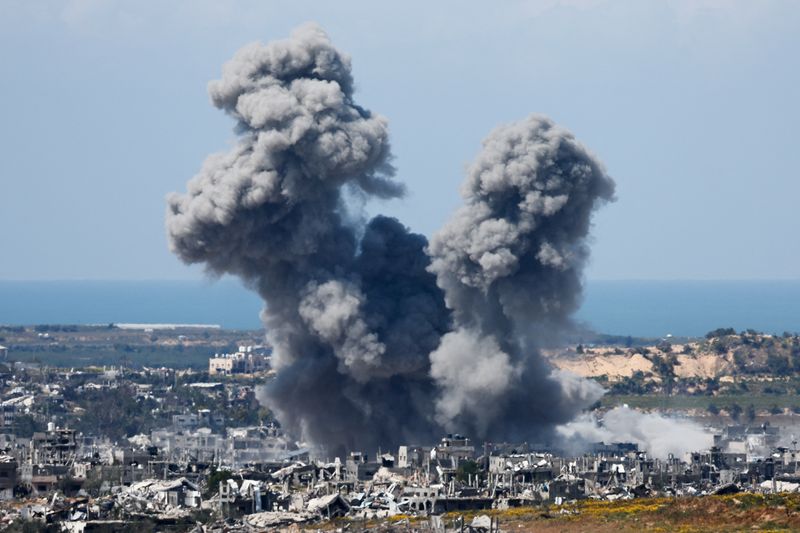By Michelle Nichols
UNITED NATIONS (Reuters) - A day after the United Nations Security Council adopted a resolution demanding a ceasefire between Israel and Hamas and the release of hostages, the war in the Gaza Strip has not stopped and the Palestinian militants have not freed anyone.
Here are details about implementation of the resolution:
WHAT DID THE UNITED STATES DO?
The United States dropped its traditional U.N. protection of its ally Israel by abstaining from the vote on Monday, instead of casting a veto. But Washington also described the brief text as "non-binding."
U.S. Ambassador to the U.N. Linda Thomas-Greenfield said on Monday that the U.S. fully supported "some of the critical objectives in this non-binding resolution," but did not agree with everything in the text - which also did not condemn Hamas.
This sparked immediate push-back from other Security Council members, U.N. states and rights groups and raised questions about how it could affect Washington's efforts to address other global crises at the United Nations.
IS THE RESOLUTION LEGALLY BINDING?
Under the founding U.N. Charter, "members of the United Nations agree to accept and carry out the decisions of the Security Council." Many member states have cited this - Article 25 - in pushing back against the U.S. remarks.
"All the resolutions of the Security Council are international law. So to that extent, they are as binding as international law is," deputy U.N. spokesperson Farhan Haq said on Monday. "Ultimately, implementation is a question of international will."
Thomas-Greenfield's spokesperson, Nate Evans, told Reuters on Tuesday that the resolution "does not create new obligations under international law, such as what the council does when it imposes obligatory sanctions."
"Nevertheless, even though the resolution lacks binding provisions, all Security Council resolutions carry great weight and should be implemented," he said.
WHAT HAPPENS IF THE RESOLUTION IS NOT IMPLEMENTED?
The U.N. Security Council has the ability to impose sanctions and authorize military force to maintain or restore international peace and security.
Such action requires the adoption of a resolution. To pass, a resolution needs at least nine votes in favor and no vetoes by the United States, Russia, China, France or Britain.
It is unlikely that any council action will be taken against Israel or Hamas if neither implement the resolution demanding a ceasefire for the holy Muslim fasting month of Ramadan, which finishes in two weeks, and the release of hostages.
"In reality it is sadly necessary to acknowledge that many council resolutions flop regardless of their legal status," said Richard Gowan, U.N. director for the International Crisis Group. "Warring parties all over the world have ignored or paid lip service only to past U.N. ceasefire calls."
WHAT ARE THE POSSIBLE IMPLICATIONS OF THE U.S. VIEW?
Rights groups say the U.S. claim that Monday's resolution is non-binding could create future problems.
Louis Charbonneau, U.N. director of Human Rights Watch, said the U.S. position "risks making countries less likely to comply with them, and that includes decisions the U.S. wants implemented."
Sherine Tadros, U.N. Representative for Amnesty International, said the U.N. Charter was clear on the binding nature of Security Council resolutions, adding: "I don't recall hearing the U.S. question that binding nature when it comes to other resolutions adopted, on Syria for example."
"What the U.S. has done is not only made implementation of a resolution that would have saved lives - both Israeli and Palestinian - much harder, it's also undermined the entire international system," she said.
WHAT DO THE OTHER FOUR SECURITY COUNCIL VETO POWERS THINK?
French U.N. Ambassador Nicolas de Riviere told a meeting of the Security Council on the Middle East on Tuesday: "This resolution must be applied by everyone, as provided for in Article 25 of the Charter."
During the same meeting, Russia's U.N. Ambassador Vassily Nebenzia asked if Washington's description of the resolution as non-binding meant the U.S. "no longer considers itself to be bound by the provisions of the U.N. Charter."
"If that is the case, then there is no point in our discussions in the chamber at all. One of the permanent members of the Security Council has essentially openly stated that it does not accept the charter of our organization," he said.
Russia itself has been reprimanded by the U.N. General Assembly for violating the U.N. Charter by invading Ukraine in February 2022. Russia used its veto power to prevent the Security Council from taking any action against it over Ukraine.
China's deputy U.N. Ambassador Geng Shuang said on Tuesday that council resolutions are binding and "this is beyond any doubt or challenge." He said the U.S. statement that Monday's resolution was non-binding "makes us question the political will and sincerity of the U.S."
When asked if the resolution was binding, Britain's U.N. Ambassador Barbara Woodward said on Monday: "This resolution needs to be implemented immediately ... It sends a clear council message, a united council message, and we expect all council resolutions to be implemented. This one is not any different."
